
Suu Kyi meets her political party
Detained Burmese pro-democracy leader Aung San Suu Kyi is reported to
be optimistic about the chances of reconciliation with the military
junta.
Her comments came as she met members of her political party for the
first time in more than three years.
A party spokesman said Ms Suu Kyi appeared energetic and full of
ideas despite her time under house arrest.
Ms Suu Kyi earlier met the military government official appointed to
conduct a dialogue with the opposition. The talks come a day after Ms
Suu Kyi said she would work with the junta to achieve constructive
dialogue.
She told her colleagues in the National League for Democracy (NLD)
that a healing process was needed following the suppression of recent
protests by the military.
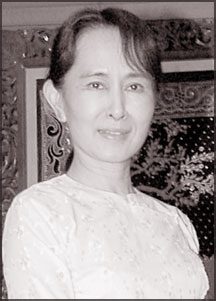
This healing, she said, should include the release of political
prisoners.
The London representative of the NLD, Win Naing, told the BBC that he
believed the generals were willing to start a dialogue, but he also
urged caution.
"They are very manipulative, and very difficult to deal with," he
said.
"That's why it's a matter of time. We have to wait to see how
positive they are, and how much they make improvements."
According to reports from Rangoon, three members of Ms Suu Kyi's
National League for Democracy (NLD) party attended the meeting.
They said that Aung Kyi, the official assigned to liaise with Ms Suu
Kyi, was present at the beginning of the meeting and then left. Mr Aung
Kyi then met Ms Suu Kyi for another hour.
NLD spokesman U Nyan Win is reported to have said that Ms Suu Kyi
believed the government was willing to work for national reconciliation.
She made similar comments in a statement delivered by UN envoy
Ibrahim Gambari on Thursday.
"In the interest of the nation, I stand ready to co-operate with the
government in order to make this process of dialogue a success," he
quoted her as saying, as he ended a six-day visit to the country.
It was his second trip there since troops suppressed anti-government
protests in September.
Meaningful dialogue
Ms Suu Kyi has not met members of her own party since May 2004. The
junta has kept her under house arrest for 12 of the past 18 years.
The NLD won polls in 1990 but was never allowed to take power.
Her written statement, read to reporters by Mr Gambari, was her first
public comment since her latest round of detention began in May 2003.
Ms Suu Kyi welcomed Aung Kyi's appointment as a go-between and
described the first meeting between the two, on 25 October, as
constructive.
But she called for preliminary consultations to conclude soon, to
make way for a "meaningful and time-bound dialogue" with Burma's
leaders.
Meanwhile, a UN statement issued at the end of Mr Gambari's visit
said that progress had been made.
"We now have a process going which would lead to substantive dialogue
between the government and Daw Aung San Suu Kyi as a key instrument in
promoting national reconciliation," it said.
But correspondents have expressed doubt over the government's
commitment to a genuine process of dialogue aimed at reform.
The goal of such a dialogue process would be movement towards
multi-party democracy - something in which Burma's generals have shown
minimal interest.
"I find it very difficult to trust them. I hope this is not some new
ploy," a roadside book seller in Rangoon told Reuters news agency. And
in the early stages of Mr Gambari's visit, there were unpromising signs.
Firstly, the UN envoy was not allowed a meeting with top General Than
Shwe, and then Information Minister Kyaw Hsan, in a meeting with Mr
Gambari, accused the international community of bullying Burma.
Mr Gambari is to return to Burma in the next few weeks, the UN
statement said.
BBC
India, Russia to strengthen ties
India and Russia have agreed to boost economic and military ties at
the end of Indian PM Manmohan Singh's two-day visit to Russia.
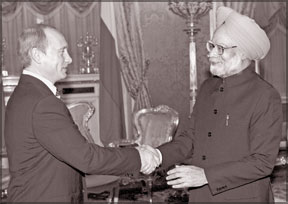 The two sides signed agreements to jointly develop a military
transport aircraft and mount a join mission to the moon, among other
things. The two sides signed agreements to jointly develop a military
transport aircraft and mount a join mission to the moon, among other
things.
Mr Singh met Russian President Vladimir Putin, the latest in a series
of yearly meetings between the two allies.
The two countries have had close links since Soviet times. Mr Singh
said both sides were working on an agreement that would allow Russia to
build four nuclear reactors in India, according to reports. Russia is
already building a civilian nuclear power plant in India.
Strategic partnership
"We paid special attention to cooperation in the sphere of nuclear
cooperation, to the sphere of military-technical cooperation," Mr Putin
was quoted as telling reporters by Reuters news agency.
Mr Singh said military cooperation is one of the "pillars of
strategic partnership" between the two countries.
India remains a leading buyer of Russian weaponry. Russia is
currently bidding to supply more than 120 fighter planes to Delhi.
Russia and India are discussing collaborating on the next generation
of fighter jets and medium-range transport aircraft.
The two countries are also rapidly deepening co-operation in the
energy sector. Although ties between the two countries are strong, the
relationship faces new challenges, including competition from the West
and the growing economic and military might of China.
BBC
Iran president attacks 'traitors'
Iranian President Mahmoud Ahmadinejad has denounced as "traitors"
those in Iran who have criticised its nuclear programme, state media
have reported.
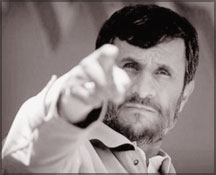
Mr Ahmadinejad said the "internal elements" would be exposed if they
did not stop pressurising his government, in a speech at a university in
Tehran.
Reformists and several senior clerics have challenged Iran's nuclear
policy. Last week, Mr Ahmadinejad was quoted as claiming his
government's critics were less intelligent "than a little goat".
The comparison was made in a speech he made in South Khorasan
province on Wednesday, according to Farda, an Iranian website affiliated
to so-called pragmatic conservatives.
Although the remarks were reported by a number of conservative and
pro-reform newspapers, Mr Ahmadinejad's spokesman has insisted he was
misquoted in an example of "press charlatanism".
Traitors
In his speech at Tehran's Science and Technology University, Mr
Ahmadinejad said he had no intention of halting Iran's nuclear programme
despite warnings by rival politicians and several clerics of the serious
threats facing the country.
The UN Security Council has imposed sanctions on Iran because of
fears it is seeking to develop nuclear weapons, while the US has not
ruled out military action.
"These people are traitors and, based on our pact with the nation, we
will not back down," he said, according to the official news agency,
Irna.
"If they do not give up their pressures on [the government] over the
atomic issues, we will expose them to the Iranian nation," he added.
"These are traitors and, in accordance with the vows we have taken to
the nation, we will not back down and be onlookers."
Mr Ahmadinejad said he had chosen not to reveal their identities
"because of some sensitivities", but warned he would do so "upon closure
of the nuclear issue".
"They sent people to the enemy to regularly give them information
from within the ruling system every week. We even have a recorded speech
of one of them who tells the enemy: 'Why should you give up?... Step up
pressure to make [Iran] retreat'," he claimed.
The president also said his critics had pressurised a judge "to
acquit a suspect for spying", which correspondents say might be a
reference to Hossein Mousavian, the former top nuclear negotiator who
was detained in May for "security reasons".
Dangerous
Mr Mousavian is an ally of former President Akbar Hashemi Rafsanjani,
who recently voiced concerns about a military attack.
"The danger is serious and everyone should try to preserve the
country's interests," Mr Rafsanjani said two weeks ago.
On Thursday, Mr Ahmadinejad's predecessor, Mohammad Khatami, warned
of an escalating crisis between Iran and the international community.
"Ruling the country by those who impose their ideas is very
dangerous," he told a gathering of reformist leaders.
Iran's former top nuclear negotiator, Ali Larijani, resigned last
month over reported disagreements with Mr Ahmadinejad on how to proceed
on the nuclear issue.
BBC
Be wary of the enemy within: Rahul
All-India Congress Committee general secretary Rahul Gandhi said that
the biggest threat to the party was from the "enemy within." He
emphasised that the only opposition to the Congress was its incapability
to represent people, and biggest drawback - failure to connect with
people.
The Amethi Member of Parliament, who attended the first meeting of
the Uttar Pradesh Congress Coordination Committee, stressed on
connectivity with people and accountability to bring the Congress back
on the rails.
Talking to mediapersons after the meeting, he pointed out that
organisational weaknesses were the bane of the party which had kept it
out of power in the State for 18 years.
Mr. Gandhi said that all these years the party was unable to attract
youth. He would endeavour to make youth the vehicle of accountability.
He wanted more youth inducted into the party.
The Hindu
'TV channels abiding by code to go on air'
President Gen Pervez Musharraf told the Ministry of Information to
allow only those private television channels to broadcast their
programmes which agreed to abide by the new Code of Conduct laid down by
the Pakistan Media Regulatory Authority (Pemra).
The president was presiding over a high-level meeting held to review
the situation arising out of blocking of private TV transmissions on
November 3.
The president said that although he welcomed criticism and was a firm
believer in the freedom of the media,, he had to take action to check
rising vulgarity in TV programmes and 'defamation by design' of
government functionaries.He said that had everyone behaved responsibly,
the government would have had no problem with the independence of media.
Dawn, Pakistan
Japan eyes global warming as pillar of aid to Africa
Japan plans to make support of Africa's fight against global warming
one of the pillars of a declaration to be made at next year's
international African aid conference in Yokohama, Foreign Ministry
officials said Monday.
The "Yokohama Declaration," to be adopted at the fourth Tokyo
International Conference on African Development, or TICAD, in May, will
also call for measures to help accelerate economic growth, promote peace
and prevent environmental degradation in the region.
By adopting the declaration, Japan apparently aims to differentiate
its policy toward Africa from resource-hungry China's efforts to cement
ties with the region.
At a ministerial preparatory meeting in August for the Yokohama
conference, Japan criticized China for violating international rules by
offering loans to African and Southeast Asian nations in a bid to secure
natural resources in those regions.
Japan Times
Oil spill could pollute Black Sea for 15 years
The Black Sea is facing its most serious ecological threat for years
after a fierce storm sank five ships, including an oil tanker and bulk
carriers laden with sulphur.
Fuel barges were also washed ashore by the heavy seas and more than
20 sailors were swept from their vessels. At least 2,000 tonnes of fuel
oil spilt into the water when a tanker broke up in the Kerch Strait,
which links the Black Sea and the Sea of Azov, between Russia and
Ukraine.
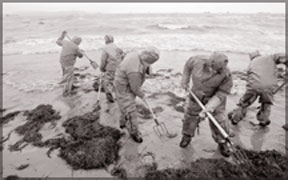
Three ships carrying a total of 6,500 tonnes of sulphur sank close to
the Russian town of Port Kavkaz as 70mph (110km/h) winds and 18ft (6m)
waves battered the Black Sea coast. Another 40 vessels were evacuated
from the port. Fifteen crew were missing from a cargo ship that went
down near the Ukrainian port of Sevastopol. Four other ships, including
two barges loaded with oil, also ran aground during the storms on
Sunday, when at least 35 crew members were rescued.
Environmental groups said that the region faced its most serious
ecological threat for years. Vladimir Chuprov, a spokesman for
Greenpeace in Russia, said: "Fuel oil will settle on the seabed and
cause hydrocarbons to permeate the Sea of Azov. This will lead to a
shortage of oxygen in the water and the unique fauna will suffer
greatly."
Oleg Mitvol, deputy head of the Russian state environmental watchdog,
said that the seabed could be polluted for up to 15 years without
strenuous efforts to clear the oil away.
About a hundred workers at Ilyich, half way between Kavkaz and
Novorossiisk, used shovels and a bulldozer to remove oil that had washed
up along an eight-mile stretch of sand.
As many as a thousand birds lay on the beach coated in oil and unable
to fly. Workers said that the birds were being attacked by wild dogs.
Russian environmental officials said that the sulphur did not appear
to pose any immediate environmental danger. The polluted area lies along
the migration route from central Siberia to the Black Sea for Siberian
diver birds.
The bodies of three sailors, all wearing life jackets, were found
yesterday near the island of Tuzla, in southern Russia, the Emergency
Situations Ministry said. They were among eight missing crew of the
Nakhichevan, one of the freighters that sank with its cargo of sulphur.
Ships and helicopters scoured the area to find survivors as warnings
of a second storm were issued. Officials in Novorossiisk, the
second-biggest oil exporting port in Russia, told tankers not to dock
because of the deteriorating weather.
President Putin ordered Viktor Zubkov, the Prime Minister, to fly to
southern Russia to oversee recovery operations.
The fresh storm warning forced the suspension of operations to
recover the Volgoneft-139 tanker, which was loaded with 4,800 tonnes of
oil when it broke up.
Recovery crews would try to pump the remaining oil off the tanker
once the weather improved, then tow it into port. The vessel's 13 crew
were all rescued.
Times on line, UK
Spain seeks to defuse Chavez row
The Spanish foreign minister has moved to defuse a public row between
Venezuelan President Hugo Chavez and Spanish King Juan Carlos.
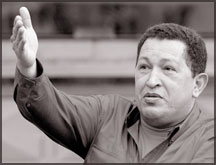
"I don't believe it should affect relations with Venezuela", he said.
On Saturday the king told Mr Chavez to "shut up" at a summit in Chile
after the president said ex-Spanish PM Jose Maria Aznar was a "fascist".
The next day Mr Chavez said the king was "imprudent" and asked if he
knew in advance of the 2002 coup against him.
Spain's Foreign Minister Miguel Angel Moratinos said that he wanted
dialogue with Venezuela to continue "on condition that we are
respected".
"We want to have good relations with everyone, but always with
respect for institutions. If we are not shown respect, we must react,"
he said.
The spat began at the Ibero-American Summit in Chile's capital,
Santiago, when Mr Chavez called Mr Aznar, a close ally of US President
George W Bush, a fascist, adding "fascists are not human. A snake is
more human."
Current Spanish PM Jose Luis Rodriguez Zapatero then said: "[Former
Prime Minister] Aznar was democratically elected by the Spanish people
and was a legitimate representative of the Spanish people."
When Mr Chavez repeatedly tried to interrupt, the king leaned forward
and said: "Why don't you shut up?" before storming out.
'Intolerable'
In Spain, the king's actions were applauded.
El Mundo said: "The king has put Chavez in his place in the name of
all Spaniards." The left-leaning El Pais said Mr Chavez's outburst was
"intolerable".
Then, as Mr Chavez was leaving the summit, he questioned whether
Spain's ambassador had had the monarch's blessing when he appeared with
Venezuelan interim president Pedro Carmona during the two-day coup in
2002.
"Mr King, did you know about the coup d'etat against Venezuela,
against the democratic, legitimate government of Venezuela in 2002?" he
asked at a news conference. On Sunday, Mr Chavez said he hoped the spat
would not damage relations.
"But I think it's imprudent for a king to shout at a president to
shut up. Mr King, we are not going to shut up."
BBC
US and Germany vow Iran diplomacy
President George W Bush and visiting German Chancellor Angela Merkel
say they will continue to seek a diplomatic solution to Iran's nuclear
programme.
The comments came in a news conference at Mr Bush's Texas ranch, held
during Mrs Merkel's two-day trip there.
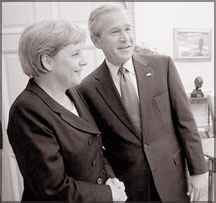 Mrs Merkel said more sanctions might be required to force Iran to
give up its nuclear aims - and Germany would study its business ties
with the country. Mrs Merkel said more sanctions might be required to force Iran to
give up its nuclear aims - and Germany would study its business ties
with the country.
Mrs Merkel has become one of President Bush's closest European
allies.
Her visit follows that by French President Nicolas Sarkozy - and
correspondents say Mr Bush is undertaking a charm offensive to woo the
two influential European leaders.
Iran argues it is entitled under the terms of the nuclear
Non-Proliferation Treaty to enrich uranium for peaceful purposes, and is
ignoring a demand from the UN Security Council to stop. On Saturday, Mr
Bush said the US would continue to pursue the diplomatic route to press
Iran to change course.
"What the Iranian regime must understand is that we will continue to
work together to solve this problem diplomatically, which means they
will continue to be isolated," he told reporters at the ranch in
Crawford.
"And what the Iranian people must understand is that we respect their
heritage and respect their traditions, respect their potential - but
it's their government that has made the decisions that are denying them
a bright future."
Mrs Merkel warned that if Iran refused to freeze its nuclear work,
then "we need to think about further possible sanctions".
The US, Russia, China, France, Britain and Germany have agreed to
draft a UN resolution calling for new sanctions and officials are
meeting in nine days to finalise a text unless the UN's nuclear watchdog
reports concessions by Iran.
Mrs Merkel added that she would work with the business sector in
Germany - one of Tehran's main trading partners - to reduce trade with
Iran. Washington has been lobbying its allies to cut business links.
The BBC's Adam Brookes in Washington says although the two leaders
appeared to be of one mind, one US source said talks between US and
German officials in the lead-up to the visit had been messy.
For one thing the Germans appear reluctant to place tough unilateral
sanctions on Iranian banks and other entities the way the US has just
done, he says.
In remarks on Pakistan, Mr Bush said President Pervez Musharraf had
taken "positive steps" to return to constitutional rule, and he expected
that to happen "as quickly as possible".
But he said "eradicating al-Qaeda" remained a priority for both the
US and Pakistan, and he remained confident that the Pakistani leadership
was committed to the same aim. "We share a common goal," Mr Bush said.
Ms Merkel said that the Middle East, Lebanon, the Doha trade talks,
reform of the UN Security Council and climate change had also been on
the agenda.
She said that the two had encountered some "differences of opinion"
over steps to take on climate change.
BBC
Clinton in planted questions row
The US presidential candidate, Hillary Clinton, has criticised her
aides after she was accused of taking pre-arranged questions at a rally
in Iowa.
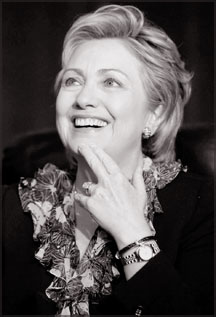
The allegation was made by a student, who said a Clinton campaign
aide asked her to pose a specific question.
Mrs Clinton said she had been unaware her aides had planted the
question. Question-planting has been used in US campaigns, but is
usually avoided because it can become an embarrassment for candidates
when revealed.
A student at Grinnell College, Muriel Gallo-Chasanoff, told her
campus newspaper she had been asked by a Clinton aide to pose a question
about global warming at a rally in Newton, Iowa.
"It was news to me," Mrs Clinton said, "and neither I nor my campaign
approve of that, and it will certainly not be tolerated."
Planting questions is not illicit during US elections, but the
allegations could affect Mrs Clinton's campaign. She has already been
accused of avoiding tough questions, analysts say.
Mrs Clinton is locked in a tough battle in the Iowa caucus with her
Democratic opponents Barrack Obama and John Edwards, and the revelations
could affect her standing in opinion polls.
She enjoys a commanding lead nationwide, but an upset in Iowa, which
kick-starts the primary season on 3 January, could give fresh impetus to
her main rivals.
BBC |
